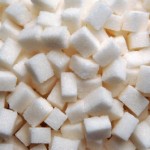Podcast: Play in new window | Download

In this episode we discuss the role of sugar, our brain and recovery… Last week we learn about how running can be a tool for helping us deal with difficult memories. One of the ways running helps is by increasing a key brain protein, brain-derived neurotrophic factor (BDNF).
The sweet white powder we call sugar is in most processed food products. It has a powerful effect on our brain in producing a short lived pleasure response. But it can come at great expense. Sugar has been linked to obesity, diabetes, cancer and other health problems. But what does that mean for those dealing with Post-traumatic stress? It is estimated that Americans consume 22-32 tsp. of sugar each day! An estimate for the U.S. Department of Agriculture says that we consume an amount equal to 31 five pound bags each year!
It has been shown to influence brain function. In particular BDNF, a key brain protein involved in memories, is negatively impacted by sugar. In recovering from PTSD we need all the proper neurotransmitter working as designed. Getting sugar out of your diet is not likely to cure PTSD. But in combination with all the other tools at our disposal it could help further our progress toward victory.
Some resources for further investigation: A CBS News/60 Minutes Report (See how “addicting” sugar can be)
What Eating Too Much Sugar Does to Your Brain http://www.psychologytoday.com/blog/neuronarrative/201204/what-eating-too-much-sugar-does-your-brain
Brain-derived neurotrophic factor: http://en.wikipedia.org/wiki/Brain-derived_neurotrophic_factor
What Sugar Does to Your Brain: http://www.olsonnd.com/what-sugar-does-to-your-brain/
The Effects of Energy-Rich Diets on Discrimination Reversal Learning and on BDNF in the Hippocampus and Prefrontal Cortex of the Rat http://www.ncbi.nlm.nih.gov/pmc/articles/PMC2042136/
Sugar: The Bitter Truth (The SHORT Version)
Sugar: The Bitter Truth – Dr Robert Lustig, MD, University of California http://youtu.be/dBnniua6-oM
Secrets of Sugar – CBC News
![]()
![]() Are you drawn to sweets (or other carbs) when you are stress? I am.
Are you drawn to sweets (or other carbs) when you are stress? I am.
* Sugar Lumps by By Suat Eman at freedigitalphoto.net


